Use Electricity and Water Wisely
Reducing your electricity and water use by avoiding waste helps people save money. It also helps preserve our natural resources. Here are some tips for reducing your electricity and water use at home and at school.
Save at Home
Bathing and Washing
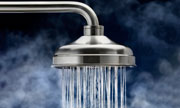 Take shorter showers.
Take shorter showers.- Ask an adult to install energy-saving, low-flow showerheads.
- Wash full loads of laundry and dishes.
- Tell an adult about any water leaks.
Appliances
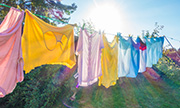 Open refrigerator doors only when necessary and close them firmly.
Open refrigerator doors only when necessary and close them firmly.- Use a clothesline or drying rack instead of a dryer.
- Ask an adult to cook using the microwave instead of the conventional oven.
- Unplug appliances you rarely use. (Many appliances use energy when plugged in, even if they are not on.)
Lighting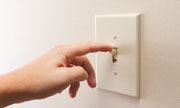
- Turn off lights when they are not in use.
- Ask an adult to install energy-efficient light-emitting diodes (LEDs). These last longer and use far less energy than other light bulbs.
Heating and Cooling
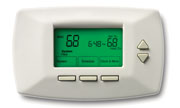 Keep doors and windows closed when the heat or air conditioning is on.
Keep doors and windows closed when the heat or air conditioning is on.- Ask an adult to keep the heat at 68°F during the day and much lower at night.
- Ask an adult to keep the air conditioning at 76°F to 78°F.
- Use a ceiling fan to cool with less energy. Remember to turn it off when leaving the room.
Electronics
- Turn off the radio, TV, and other electronics when finished.
- Turn off or sleep the computer when it is not in use.
- Unplug chargers when not in use.
Save at School
Lights and Computers
- Ensure lights and computer monitors are turned off when not in use, especially at recess and lunch.
Heating and Cooling
 Make sure books or furniture do not block the vents in your classroom.
Make sure books or furniture do not block the vents in your classroom.- Encourage everyone to keep doors and windows closed when heating or air conditioning is running.
Bathrooms and Fountains
- Turn off the water in the bathroom when you are finished using it.
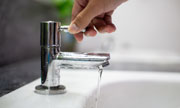 If you find a water fountain that won’t turn off, a leaky faucet, or a toilet that’s running, report it to your teacher or school custodian.
If you find a water fountain that won’t turn off, a leaky faucet, or a toilet that’s running, report it to your teacher or school custodian.
Make a Conservation Action Plan!
View this activity to learn how.
Solar Power Safety
 Solar power is all around us! More and more people are transforming the sun’s energy into electricity to power their lights and appliances, heat their water, and even run their vehicles. You’ve probably seen solar panels on the rooftops of nearby homes or businesses, or in yards or fields.
Solar power is all around us! More and more people are transforming the sun’s energy into electricity to power their lights and appliances, heat their water, and even run their vehicles. You’ve probably seen solar panels on the rooftops of nearby homes or businesses, or in yards or fields.
Did you know a solar power system can generate enough electricity to injure or kill you? Here’s what you need to know and do to stay safe:
-
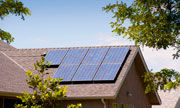 Protect solar panels. Photovoltaic (PV) cells are what you see inside glass-faced solar panels. Specially hardened glass protects PV cells from wind and weather, but this glass will crack or break if a heavy object hits or falls on it.
Protect solar panels. Photovoltaic (PV) cells are what you see inside glass-faced solar panels. Specially hardened glass protects PV cells from wind and weather, but this glass will crack or break if a heavy object hits or falls on it.-
Safety Tip: Always stay at least 3 feet away from PV panels. Never put objects on them, climb on them, hang things from them, or throw things at them.
-
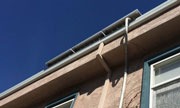
Respect cables and equipment. Power cables run from rooftop PV panels down the sides of buildings to meters, batteries, and/or other equipment. These cables are typically contained in special pipes, but some areas may be exposed.
-
Safety Tip: Stay away from pipes or wires that lead from PV panels, and never tamper with electrical meters, batteries, or other equipment. Also, keep ladders away. PV equipment and batteries carry live electrical current and are easily damaged.
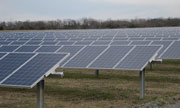
-
-
Avoid buried hazards. Some PV systems are located on the ground. The electricity they produce is carried on buried electrical cables that are very dangerous to contact.
-
Safety Tip: Never dig near ground-level PV systems.
 If adults plan to dig near one, remind them to ask the property owner and call 811 before digging to find out where buried electrical lines are located.
If adults plan to dig near one, remind them to ask the property owner and call 811 before digging to find out where buried electrical lines are located.
-
Careers in Energy
 Energy is a broad field, with a wide range of job possibilities that will keep growing as our energy needs increase. Energy jobs are so diverse that no matter what your interests are, chances are you’ll find a job that’s a good fit for you:
Energy is a broad field, with a wide range of job possibilities that will keep growing as our energy needs increase. Energy jobs are so diverse that no matter what your interests are, chances are you’ll find a job that’s a good fit for you:
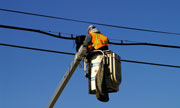
If you like science, math, and solving problems, engineering might suit you.
-
For the adventurous, some jobs will get you outside working in the elements, such as a line worker who repairs power lines after storms or a person who works out at sea on an oil or gas rig.

-
If you love to investigate and do research, you might enjoy work developing more efficient and varied systems of energy delivery, more efficient uses for renewables, or sources of green energy.
-
If you’re a people person, there are jobs
 such as a team leader or call center operator that keep you working closely with others.
such as a team leader or call center operator that keep you working closely with others.


